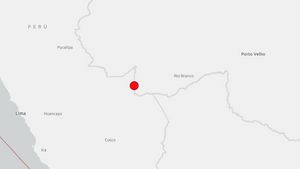JAKARTA - Spokesperson for the Task Force (Task Force) Handling COVID-19 Wiku Adisasmito said that until now there is no vaccine made by AstraZeneca that has been given to the public.
Although this British-made vaccine has arrived in Indonesia some time ago, the allocation of its use will still be determined by the Ministry of Health (Kemenkes).
In addition, the use of the AstraZeneca vaccine is still waiting for the issuance of halal certification by the Indonesian Ulema Council (MUI).
"Until now, the AstraZeneca vaccine has not been injected for the national vaccination target, following the allocation process to be determined by the Ministry of Health and a halal certificate from the MUI," Wiku said in an online press conference broadcast on the YouTube account of the Presidential Secretariat, Friday, March 12.
He also confirmed that the vaccines that have arrived in Indonesia are safe to use. This is also in accordance with the European Medicine Agency statement which states, blood clots or clots are not registered as a side effect of the AstraZeneca Vaccine.
This is based on the fact that more than 10 million doses of AstraZeneca vaccine used did not indicate a risk of pulmonary embolism or venous thrombosis by age, sex, and other groups. "This shows that the number of incidents of this kind is lower in vaccine recipients than the general public," said Wiku.
When this vaccine is used later, monitoring will also continue. Later, KIPI monitoring of any vaccination products including AstraZeneca will continue to be carried out by the vaccination implementation facility which is centrally supervised by BPOM and analyzed by Komnas KIPI.
"If there is a post-immunization follow-up incident (KIPI), it will be handled accordingly," he said.
It is known, a number of countries such as Denmark, Norway and Iceland have stopped using the AstraZeneca Vaccine. This is done after a number of vaccine recipients experience blood clots.
Previously reported, the Food and Drug Supervisory Agency (BPOM) has issued an emergency use authorization (EUA) or an emergency permit for the AstraZeneca corona vaccine developed by Oxford University.
Head of BPOM Penny Lukito said the issuance of the permit was carried out after evaluating the AstraZeneca vaccine in collaboration with a number of related parties. "Based on the evaluation results, BPOM issued EUA on February 22, 2021 against the AstraZeneca vaccine," Penny said in a virtual press conference, Tuesday, March 9.
As many as 1.1 million doses of this type of vaccine have been received by Indonesia and AstraZeneca has been used in a number of other countries such as the UK, Germany and South Korea.
Penny explained that the side effects of the vaccine are still normal. The majority were only local and seismic reactions.
"The results of the overall safety evaluation of 4-12 weeks of dosing are categorized as safe," he said.
Penny added, BPOM has also received the results of the vaccine's efficacy, which is 62 percent. Meanwhile, the WHO safe limit is 50 percent.
The English, Chinese, Japanese, Arabic, and French versions are automatically generated by the AI. So there may still be inaccuracies in translating, please always see Indonesian as our main language. (system supported by DigitalSiber.id)













